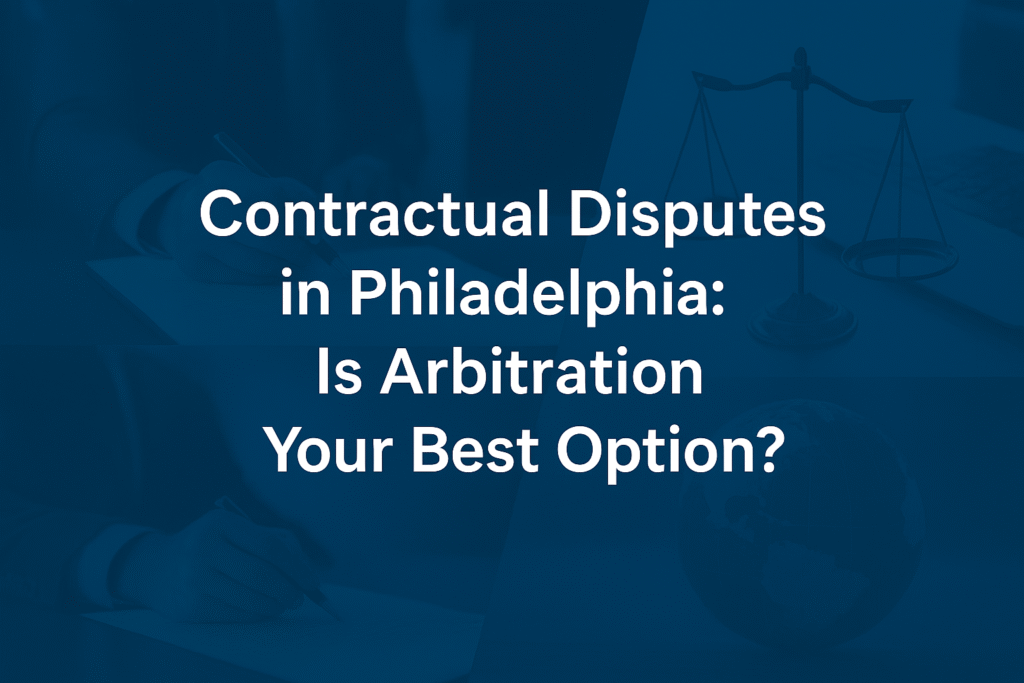Contractual Disputes in Philadelphia: Is Arbitration Your Best Option?

Introduction
The cost of doing business in Philadelphia has always been high, but one expense that many companies wish they could avoid is the time and money spent in litigation. Court dockets in Philadelphia are often overcrowded, leading to delays that can stretch into years. In the surrounding counties—Montgomery, Bucks, Chester, and Delaware—the timeline can be even longer.
So, what’s the best path forward for resolving business disputes? For many organizations, the answer is arbitration. Arbitration provides a private, binding, and frequently faster resolution process that avoids many of the pitfalls of traditional litigation. At the same time, mediation—a non-binding but highly collaborative process—can also be an effective tool in certain scenarios.
This article explores the realities of contractual disputes in Philadelphia, explains why arbitration is often the most practical choice, and highlights when mediation may be worth considering.
1. Understanding Contractual Disputes in Philadelphia
Contractual disputes come in many forms, and in a city with as diverse a business community as Philadelphia, they are unavoidable. Common types of disputes include:
- Breach of contract in business partnerships – disagreements about profit-sharing, responsibilities, or exit terms.
- Vendor/supplier disagreements – failure to deliver goods on time or disputes about payment terms.
- Employment and independent contractor contracts – issues over non-compete clauses, compensation, or misclassification.
- Construction disputes – particularly common given Philadelphia’s steady real estate development and renovation boom.
The stakes in these disputes can be significant. A delay in resolving a contract matter can stall business operations, hurt reputations, and cost both sides money.
Example: Consider a Philadelphia tech startup depending on a vendor to deliver software support. A dispute about service quality delays the product launch. Without a quick resolution, the company risks losing investor confidence and market position.
2. Traditional Litigation: Why Many Businesses Want to Avoid It
Despite its familiarity, litigation is rarely the best option for contractual disputes. Businesses in Philadelphia often cite the following reasons for steering clear of the courts:
- Overcrowded court dockets: Complex contract cases can sit for months—or years—before trial.
- High attorney fees and discovery costs: Extensive motion practice, depositions, and discovery drive up expenses quickly.
- Inexperienced Juries: Juries likely do not have the expertise or experience with contractual issues to properly determine the proper outcome.
- Public proceedings: Court filings are public records, which means reputational damage is always a risk.
Example: A Center City construction company locked in a lawsuit over subcontractor performance spent nearly two years in court. By the time the matter concluded, the company had already lost revenue opportunities because projects were tied up and legal costs drained resources.
3. Arbitration: A Faster, Cost-Effective Alternative
Arbitration is increasingly viewed as the practical alternative for contractual disputes in Philadelphia. At its core, arbitration is a private, binding resolution process where the parties present their case to a neutral arbitrator (or a panel of arbitrators).
Benefits of arbitration in Philadelphia contractual disputes:
- Faster timeline: Arbitration cases often conclude in a matter of months, compared to years in court.
- Lower costs: Discovery is streamlined, motion practice is limited, and the process avoids many of the formalities of litigation.
- Confidentiality: Proceedings are private, which is essential for reputation-sensitive industries in Philadelphia such as healthcare, finance, and professional services.
- Subject-matter expertise: Arbitrators are often chosen for their backgrounds in areas like construction law, employment disputes, or commercial transactions.
Example: A Philadelphia manufacturing company involved in a contract dispute with a supplier resolved the matter through arbitration in six months. The speed allowed both businesses to move forward without the financial drag of years in litigation.
4. Comparing Arbitration and Mediation
While arbitration is a powerful option, mediation also deserves attention. Mediation is a non-binding, collaborative process facilitated by a neutral mediator who helps parties negotiate a solution.
When mediation works best:
- Ongoing business relationships worth preserving (e.g., partners who expect to work together again).
- Parties who are open to compromise and creative solutions.
- Situations where control of the outcome is the priority.
When arbitration may be preferable:
- The parties want a final, binding decision.
- High-stakes disputes where compromise is unlikely.
- Cases where certainty and closure are more important than preserving relationships.
5. Drafting Arbitration Clauses in Philadelphia Contracts
The best time to think about dispute resolution is before a dispute even arises. That’s why many businesses include arbitration clauses in their contracts. These clauses establish, upfront, that any disputes will be resolved through arbitration rather than litigation.
Key considerations for arbitration clauses in Philadelphia-area contracts:
- Governing law: Ensure Pennsylvania law (or the appropriate jurisdiction) is specified.
- Choice of forum: Identify the arbitration forum, such as the American Arbitration Association (AAA), JAMS, or a local arbitration provider like Ari Sliffman & AJS Resolutions.
- Scope of disputes: Clearly define that “all disputes arising from or related to the contract” are subject to arbitration.
Example: A Northern Liberties restaurant drafted an arbitration clause into its vendor agreements. When a supplier failed to deliver essential products, the arbitration process allowed the restaurant to resolve the issue swiftly without putting its business operations at further risk.
6. How to Decide if Arbitration is Right for Your Business Dispute
Not every contractual dispute is best handled through arbitration. Lawyers and business owners in Philadelphia can use the following checklist to guide their decision:
- Is speed a priority? Arbitration is typically faster.
- Is confidentiality important? Arbitration keeps matters private.
- Is the relationship worth preserving? Consider mediation first.
- Are you willing to accept limited appeal rights? Arbitration decisions are binding with very limited grounds for appeal.
Guidance: Always consult with legal counsel and dispute resolution professionals to weigh the risks and benefits before deciding.
7. The Role of Local Dispute Resolution Professionals in Philadelphia
Working with Philadelphia-based mediators and arbitrators can provide distinct advantages. Local professionals understand not only the law but also the industries and unique dynamics of the region.
- Philadelphia arbitrators with construction law experience are especially valuable given the city’s active development sector.
- Mediators who understand union and employment law can help address disputes that reflect the realities of Philadelphia’s labor market.
Example: A South Philadelphia contractor involved in a union-related dispute benefited from using a local arbitrator familiar with Philadelphia labor dynamics. The arbitrator’s understanding of both the industry and the city helped streamline the process.
Conclusion
Contractual disputes are a fact of life for businesses in Philadelphia, but the method you choose to resolve them can make all the difference. While traditional litigation often means years of delay, escalating costs, and public exposure, arbitration offers a faster, more cost-effective, private, and binding resolution.
Mediation also remains a strong option when business relationships are worth preserving and parties are open to compromise.
For business owners, the bottom line is this: review your contracts now. Make sure they include clear dispute resolution provisions—whether arbitration, mediation, or both. Doing so can save time, money, and stress down the line.
Call to action: If you’re facing a contractual dispute in Philadelphia, consult a local mediator or arbitrator. Firms like AJS Resolutions specialize in arbitration and mediation tailored to the needs of Philadelphia businesses. Book Here with Ari Sliffman & AJS Resolutions.
